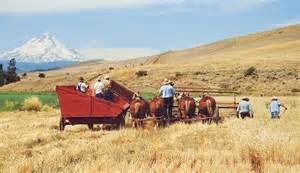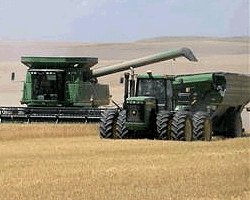|
Shelter, water, energy, food. The challenge we face today lies in rediscovering fundamental systems that are not fundamentally deadly. In the 1970’s, there began a movement that lead to the development of the various “Organic” certification and labelling systems and bodies. These systems have been a measured boon to food quality, and therefore to human beings, the land - to the entire biosphere - the world over. Having taken us this far, we at Thompson Small Farm believe that there is still further to go. We believe it is time we reinvented the term “Organic” and the systems and governing bodies that lie behind the term. To help us illustrate to you why we believe this, we’d like you to take at look at these two pictures, each depicting a modern, working farm engaged in wheat-harvest, and tell us which picture, at first glance, you think best represents a system we might label “Organic”. I expect that by basic instinct, most people would choose the picture on the left, the first picture, as being a better representation of an organic farming system. Paradoxically, the first picture is of a working Amish farm that has no Organic certification, while the second picture is of a farm with Organic certification.
If you are thinking "there is something wrong with this picture," well so are we. You already understand, instinctively, without having to give the situation any subsequent thought, why the term "Organic" needs redefining, why the Organic systems of certification need revamping. But let's do give it some further thought. Why do our instincts tell us one thing, but Organic labeling tells us another? The reason is that while both pictures represent a fundamental system - food production - one depicts a system that is fundamentally sustainable, the other a system that is fundamentally deadly. One depicts a way of life that has the potential to sever our ties to processes like the tar sands, the other requires that we mine the tar sands for all they're worth, and then find some more tar sands to mine, and oil shale to frack, and etcetera on into perpetuity. One picture depicts a system that is embedded with its own limits of scale commensurate with the healthy requirements of a living planet, the other depicts a system which knows no limits of scale. One depicts a system that sustains communities and family enterprise, the other a system that symbolises the ruin of the family farm, rural communities and the corporatization of our lives. One depicts a system that has the power to combat climate change, the other the very system that created the problem. One depicts a scene that is all about local scale, the other a scene that has no choice but to be globally scaled. We could go on. We do think it is a good thing that the farm depicted on the right must fulfill the requirement of using no agricultural poisons in the production of our food. A very good thing. We are by no means condoning abandoning the strides towards food purity the Organic movement has made, nor the principles that guide us to produce the purest quality food. On the other hand, keep in mind that when you are looking at a tractor - any tractor, (it needn't be a behemoth like this one) just like when you are looking at a horse, you are looking at all the things that go into making that object possible. When you look at a tractor you are looking at tar sands, oil shale, the removal of entire mountaintops in places like West Virginia and British Columbia, the poisoning of watersheds, the wage enslavement of once autonomous people in factories and mines, the compaction of the soil, emissions, smog, climate change, a culture of conquest and war, cultural genocide, the list goes on. How "organic" does this seem to you? How "clean", in reality, is the food a farm like the one in the second picture produces? We would argue that the poisoning goes on, it's just been outsourced away from your person. Temporarily. The problem being, it is still making its way back to you, in myriad ways. How about the horse as a fundamental power source on the farm? In the case of the horse you are looking at a power source that necessitates a human scale of enterprise. You are looking at a power source that reproduces itself, that gets all it needs from the farm, from the produce of the sun - the horse eats what you can grow as fuel, and doesn't require a massive industrial process to convert that fuel into work, nor to be there available to you in the first place. You are looking at a power source that produces emissions that are actually useful to the land: they give back to the land what is taken out as fertilizer. You are looking at a power source that is fundamental to pasture management systems that build, rather than degrade, topsoil and create a carbon sink that helps combat climate change. You are looking at a system that does not require any of the deadly processes listed in the case of the tractor in order to exist and function. You are looking at a power source that does not compact the soil. You are in fact, looking at the only solar powered tractor known to man. And while it is true that much of the equipment that is used in horse-farming today is derived from industrial processes, it is also true that the level of scale to produce such equipment can also come from the farm itself, re-utilizing materials such as steel that are currently available in vast abundance without further degradation of the biosphere. And that's the bottom line, why one picture just "feels organic" and the other does not. One picture is a picture of sustainability, and the other is a picture of a terminal condition. Only one of these pictures depicts a way of life that has a future. The picture on the left, then, depicts something that is organic, while the picture on the right depicts something that is, in reality - regardless of how we label it - not. And that's what we'd like to see taken into account where any Organic and other similar labelling systems come into play. Sustainability. For if a farm is not sustainable, if it is failing to work towards severing ties with all the fundamentally deadly processes we've provided a brief list of, how can it possibly be considered "Organic"? Rediscovering systems that are truly organic, that are sustainable, is not going to happen as an event. It is going to continue to happen as a process. It is going to happen as a transitioning that is initiated on a proactive farm-by-farm basis, at a pace that is ideally comfortable for the farmers involved and works with their economics rather than against them. It is going to happen as a process that is driven by a people, a customer base, demanding that sustainability be the issue that is brought to the fore in food production. All the while keeping in mind that change, any change - even positive change - requires us to step outside our comfort zones and develop new ones. The pioneers of the Organic Movement were part of this change, part of this process. Let's not drop the ball now. Let's keep producing quality food while adding incentives to farmers who can demonstrate they are taking steps to make their farms one day truly sustainable. "Organic" in a holistic, rather than just a specific, sense. Revamping food certification systems is one way we could offer incentive to farmers to do so, and would provide further assurance of quality - Big Picture Quality - to customers. Focusing not just on food purity, but on the even more important issue of sustainability.
2 Comments
4/10/2014 04:00:48 pm
I appreciate your idea here. Definitely it has a good content. Thank you for imparting more of your own thoughts. Good job!
Reply
Leave a Reply. |
AuthorHave a look at our "Education/Contact" page for info on the author. Archives
March 2020
Categories
All
|


 RSS Feed
RSS Feed
